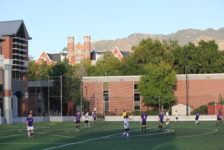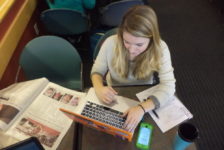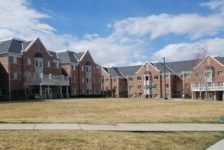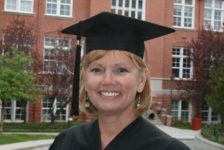
ASW’s Eco-council meets outside of the Shaw Student Center to discuss its nect month’s meeting. Andrey Chen, ASW vice president, said he doesn’t think many students know about the Eco-council because the council’s members were chosen in the middle of the semester. Photo by Chloie Dale.
In January 2015, Westminster College’s Board of Trustees approved legislation implementing a $2 increase in student fees—an initiative ASW.Senate used to create an Eco-council, which aimed to fund opportunities for student sustainability projects. But nearly a year later, not many students know about the Eco-council and the money remains untouched.
Andrey Chen, ASW’s vice president, said the money from the Sustainability Fund legislation has about $8,000 to $10,000 ready to be used but said not many students know about the Eco-council because the council’s members were chosen mid-semester.
ASW.Senate passed legislation at its Oct. 10 meeting designating Chen as the chair for the Eco-council in hopes of speeding up the process.
“While work on this council is proceeding, it is a slow process because there is not one member assigned to chair these meetings,” the legislation said. “Thus, as of now, there is no one directly responsible for organizing and conducting meetings.”
Now that ASW has named individuals to serve on the Eco-council, its members said they hope they will see more progress with the initiative.
“Currently, the work of the Eco-council is solely based on research of what we want to accomplish, how we want students to submit proposals and how extensive their projects should be,” Chen said. “Everything lies on our shoulders in terms of creating this process and that’s why it’s kind of hard. But it’s also exciting because we can work together to combine different ideas.”
ASW established the council to create a structured application process, including a rubric to follow for giving out the funds to all students for projects working toward sustainability.
“Last year, the student board realized we needed to have a way to organize a system so that students could easily have access to these funds for projects,” said Carissa Uresk, ASW’s speaker of the Senate.
Uresk was the chief justice at the time. She worked with Costa Lasiy, last year’s ASW president; Hannah Williams, who was director of budgeting and accounting; Kailey Kornhauser, ASW president 2014-2015; and Kate Puddy, who worked for the environmental center, to find the best way to organize a system that would benefit the college.
“Not only are we putting funds toward something that we really value at our school, but we’re also helping students amplify the things they want to be involved in,” Uresk said.
Chen said the Sustainability Fund has a micro grant as well as a macro grant, which will go toward more in-depth projects that may cost more money.
“If students have a good idea and can substantiate their idea through prior research that they’ve done, then they’re going to be granted money to actually do the project,” Chen said. “There’s no prior work in terms of application process or what kind of projects we want to choose. It all depends on how many applications we receive. The more applications, the more frequently we will be meeting.”
Chen said the Eco-council has had two meetings this year, with the most recent happening on Dec. 9.
Chen said he hopes the Eco-council will get more students involved in sustainability efforts, since students from any department can apply for money from the Sustainability Fund.
The Eco-council consists of five members who determine how the Sustainability Fund is distributed: Andrey Chen, ASW vice president; Wade Lennon, ASW director of budget and accounting; Mariah McCoy and Ember Bradbury, sustainability fellows appointed by the Environmental Center; and Pace Cranney, an ASW senator.
“We are the people who are going to decide which projects get funded,” Chen said. “I think it’s going to be hard to decide which projects are better than others when we don’t have enough money to fund them all.”
Uresk said she thinks Westminster’s commitment to environmental issues is partially due to its location and said she sees potential for the program to make a difference on campus.
“Because Westminster is really committed to sustainability issues, having an Eco-council where students can access funds to fund their own projects can really benefit the campus because students will create projects on campus and help [Westminster] be more sustainable,” she said.
For more information about the Eco-council, contact Andrey Chen at aac0808@westminstercollege.ed









